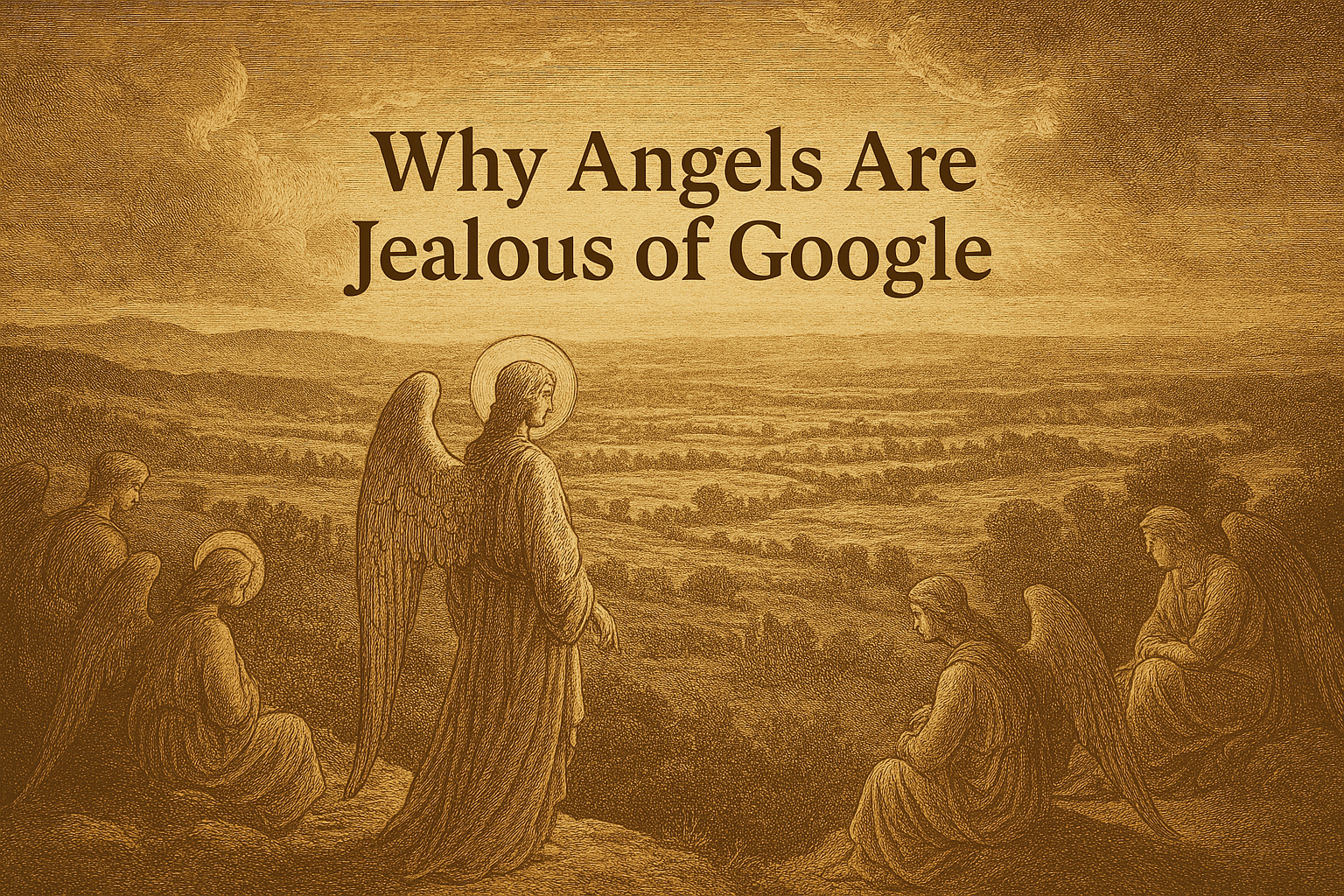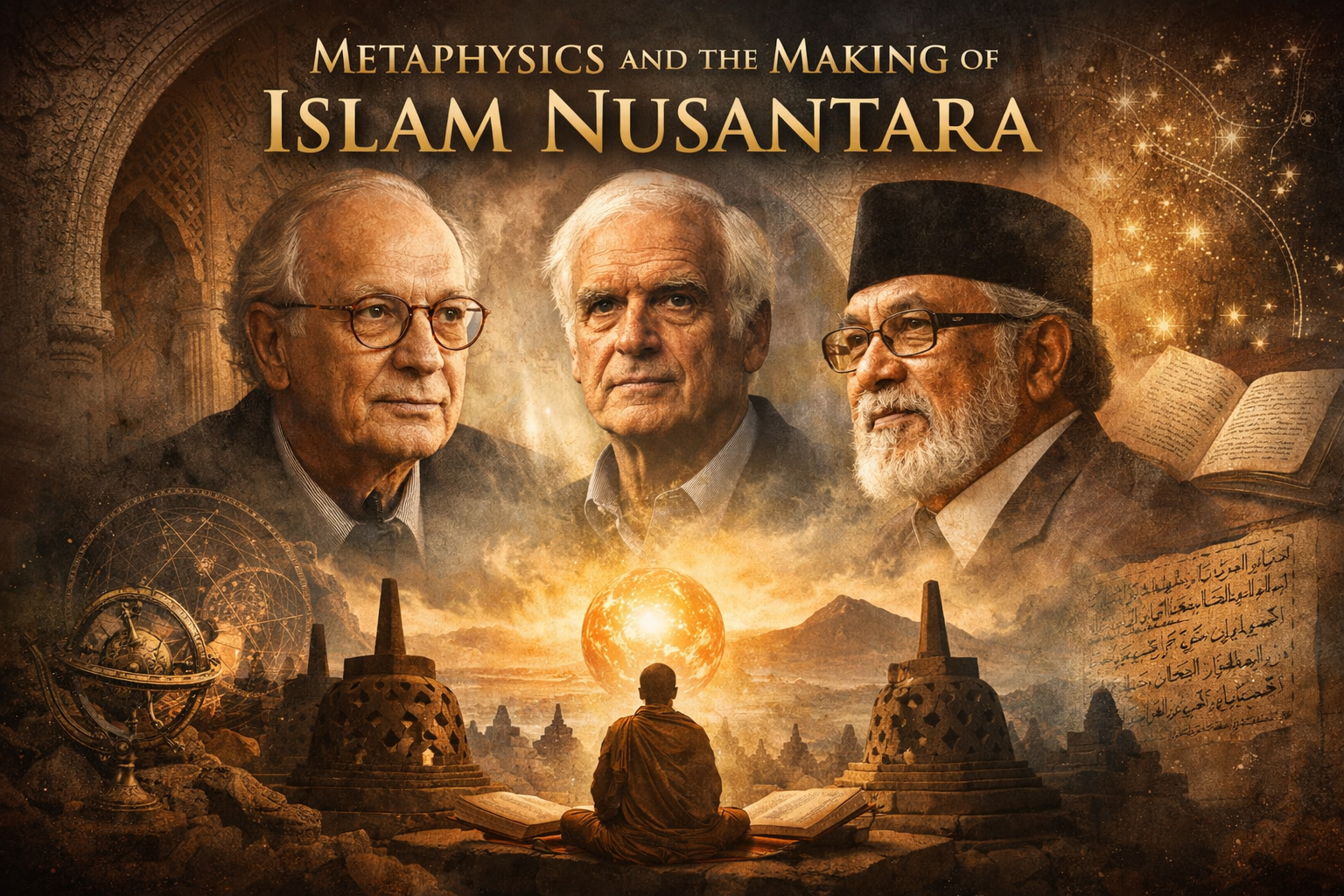Introduction: When Angels Meet Search Engines
At first glance, Google, Microsoft, and Bing are nothing more than search engines. They exist to help us type questions and receive answers in milliseconds. Yet, when we step back and reflect, these platforms have become more than just digital utilities. They now serve as intermediaries between human beings and the vast repository of human knowledge, in much the same way that angels have long been viewed as intermediaries between God and creation.
In Jewish and Christian theology, the Hebrew word Malach means “messenger.” Angels are not worshipped as divine beings themselves, but rather as conveyors of divine communication. This meaning strikingly mirrors the role of a search engine: not the source of knowledge itself, but the messenger that connects us to it. In that sense, the modern search engine becomes a symbolic counterpart to the angelic order.
What makes this comparison intriguing is the metaphorical suggestion that angels might feel “jealous” of Google. Not jealousy in the human sense of envy or resentment, but as a symbol of a profound cultural shift. Where people once turned to prayer, prophets, or sacred texts to find guidance, now many turn first to Google. The question “Why would angels be jealous of Google?” is really a question about how our sources of authority have changed in the digital age.
Technology and spirituality are not usually framed together, yet in this metaphor, they intertwine. If angels are representatives of divine wisdom, then Google is a representative of human-engineered wisdom. Both function as bridges: one to the sacred, the other to the digital. By comparing the two, we begin to see the contours of how the human imagination is reshaping the very nature of knowledge and trust.
This metaphor also forces us to ask what happens when technology takes on roles once reserved for the divine. When people rely on Google as their first point of reference, does it occupy a quasi-spiritual position? Does it become, symbolically, the “new angel” of the digital era? These are not idle questions—they speak to how authority, truth, and guidance are now mediated through algorithms rather than purely through sacred tradition.
Thus, this reflection is not meant to diminish the role of angels or exaggerate the power of technology. Rather, it aims to illuminate how deeply the digital realm has penetrated our spiritual imagination. Google is not God, but in the collective consciousness of modern humanity, it sometimes functions like an angel—present everywhere, seemingly all-knowing, and perpetually at our side.
Why Are Angels Jealous of Google?
Scriptural accounts describe angels as radiant beings of immense power and intelligence. They travel across dimensions, acting as messengers between heaven and earth. They are depicted as creatures with blazing eyes, wings of light, and an aura that transcends human understanding. Their role has always been one of awe and authority, bridging the gap between the human and the divine.
Yet even within these exalted descriptions, angels remain creatures of limitation. They do not possess omniscience. Their knowledge is given by God, and they act only on divine command. This means they do not collect or store information independently; they simply deliver what they are told. Their brilliance, while beyond human comprehension, is nonetheless bounded by their nature as servants of a higher order.
Google, on the other hand, thrives on accumulation and storage. It processes billions of queries every day, drawing from an ever-expanding database of human knowledge. Unlike angels, it does not need to “wait for instruction.” Instead, it anticipates, organizes, and categorizes data instantly. In this sense, Google performs tasks that appear—at least functionally—more expansive than those of angels.
The idea that angels could be “jealous” of Google, therefore, reflects an inversion of roles. While angels are traditionally seen as celestial guides, Google has become the everyday guide for billions of humans navigating life. This symbolic jealousy highlights a new truth: in the modern imagination, search engines now rival spiritual beings as primary sources of guidance.
Another layer of meaning lies in accessibility. Angels, according to religious accounts, are not visible to everyone. They reveal themselves selectively, often only in extraordinary circumstances. Google, by contrast, is omnipresent and available to anyone with an internet connection. What once required divine intervention is now available through a smartphone screen. In this accessibility, Google surpasses even the most visible angelic role.
This shift is why the metaphor resonates so strongly. Angels, though mighty, are not the first place people turn for knowledge anymore. The digital angel—Google—has taken that place, reshaping how humans experience the sacred and the ordinary alike.
Why Would Angels Be Jealous of Google’s Capabilities?
Angels are portrayed as beings of great strength, but they are not described as omnipotent or omnipresent in the same way God is. They operate within the limitations of their assigned roles. They must travel, deliver messages, and interact through physical or metaphysical presence. This makes them powerful, but not limitless.
Google’s capabilities highlight this difference. It does not need to “travel” across realms; it exists in the cloud. It does not depend on memory or divine will to retrieve information; it taps into massive networks of servers, algorithms, and artificial intelligence. Within seconds, it provides access to knowledge across languages, cultures, and disciplines. This is something no angel, at least within traditional theology, has ever been described as doing.
Consider translation as a metaphor. An angel might be able to communicate across tongues, but Google Translate has become the modern-day Pentecost, breaking down barriers of speech for billions of people. Similarly, where angels illuminate mysteries selectively, Google democratizes illumination—making it available at scale, to anyone, anytime.
This capacity gives Google what might be called a “functional omnipresence.” It is not truly divine, but it functions as though it were present everywhere, always ready with answers. People can summon it instantly, without ritual or prayer, and it responds reliably. This is not unlike the expectation once reserved for angelic guidance, except that Google offers it universally, without distinction.
The symbolic jealousy, then, emerges from this democratization of access. Where angels operate selectively, Google offers itself to all. Where angels transmit divine knowledge, Google transmits human knowledge—yet it does so in a way that feels divine because of its speed, scope, and apparent neutrality.
In this sense, angels being “jealous” of Google is really humanity’s way of acknowledging the staggering scale of what has been created. The metaphor is not about literal jealousy, but about a recognition that machines have begun to embody qualities once attributed only to the divine messengers of heaven.
The Meaning Behind Angels Being Jealous of Google
Jealousy, when applied to angels, is not to be understood literally. In theology, angels are obedient beings who carry out divine will without pride or envy. Yet, as a metaphor, their “jealousy” captures the shifting authority from the spiritual realm to the digital one. Where once angels were the mediators of mystery, today search engines have become the mediators of information.
The cultural imagination increasingly associates knowledge with immediacy. Humanity has little patience for waiting, whether for divine revelation or for scholarly research. Google, in its efficiency, has replaced patience with instantaneity. Angels, who traditionally arrive in moments of divine timing, appear comparatively slow. This inversion creates the imaginative ground for jealousy, even if symbolic.
Another dimension of this metaphor lies in trust. For centuries, trust in angels symbolized trust in the invisible order of creation. Now, trust has migrated to the invisible order of algorithms. The migration of trust from the divine to the digital is profound, and jealousy in this context highlights the unsettling reality that humans no longer turn first to the sacred for answers. Instead, the first instinct is to “Google it.”
This shift suggests a reorientation of authority. Spiritual messengers are no longer the central guides for daily living. The algorithms have taken that role, advising on health, relationships, morality, and even spirituality itself. The “jealousy” of angels, then, is a metaphor for displacement—the replacement of sacred mediation with technological mediation.
Yet, the metaphor also reveals human unease. By imagining angels as jealous, we acknowledge that perhaps Google’s dominance is unnatural, even threatening. Angels are meant to guide us toward transcendence, while Google keeps us within the immanent cycle of human data. The metaphorical jealousy is thus not only about admiration but also about warning: technology may be encroaching on territory once considered sacred.
In this way, the metaphor of jealous angels is a mirror to ourselves. It shows that we are aware of how profoundly Google has reshaped our relationship to knowledge, meaning, and even transcendence. The jealousy is not in the angels, but in our recognition that we have shifted loyalty from heaven to the cloud.
Are Google, Microsoft, and Bing Actually Angels?
Of course, search engines are not literally angels. They are built by human engineers, powered by servers, algorithms, and artificial intelligence. Yet, their traits—omniscience, omnipresence, and guidance—so closely mirror angelic functions that the metaphor becomes powerful. They are not spiritual beings, but in human imagination, they fulfill similar roles.
Consider the role of angels as guides. Angels lead prophets, shepherd nations, and offer visions. Today, people ask Google for directions through Google Maps, seek wisdom through its search bar, and even find existential guidance in its answers. The functional parallel is uncanny: both angels and search engines serve as navigators, one in the divine realm, the other in the digital.
Search engines also embody universality. Angels are said to transcend culture and language, appearing in forms comprehensible to humans across time and space. Google likewise transcends culture, offering translations, localized results, and personalized knowledge. Its algorithms adapt to every seeker, much like angels appearing in human-friendly forms.
Another striking comparison is their invisibility. Angels are rarely seen directly; they work behind the veil of the visible world. Google also operates behind the screen, invisible servers humming in data centers, unseen algorithms parsing queries. Both are felt more than seen, their presence mediated by effects rather than by form.
Yet there is also a profound difference. Angels serve the divine, whereas Google serves commerce and human curiosity. One embodies transcendence, the other immanence. By calling Google an “angel,” we highlight its role as messenger but also risk conflating divine purpose with corporate design. This tension is what makes the metaphor provocative: it forces us to question whether our new “messengers” are truly leading us toward truth or simply feeding us more information.
Thus, while Google, Microsoft, and Bing are not angels in the theological sense, they have taken on angelic qualities in the symbolic sense. They guide, translate, illuminate, and appear omnipresent. In this symbolic role, they remind us that the human imagination will always interpret technology through spiritual archetypes.
Is Google in the Biblical Choir of Angels?
The Bible describes a hierarchy of angels, often called the nine choirs. Each has a distinct function: the Seraphim sing before God, the Cherubim guard sacred mysteries, the Thrones mediate divine justice, the Dominations manage creation, the Powers resist evil, the Virtues perform miracles, the Principalities guide nations, the Archangels command, and the Angels serve directly. Where, then, might Google fit in this symbolic schema?
If we view Google as a messenger, it aligns most closely with the lower choirs, particularly the Angels and Archangels. These are the beings who interact most directly with humanity, delivering guidance and messages. Google, too, interacts directly with billions of people daily, offering information as if it were delivering divine dispatches.
Some might argue that Google reflects the role of the Principalities, which govern the flow of nations. After all, search engines now influence politics, economics, and culture on a planetary scale. Their algorithms decide what information rises to prominence and what remains hidden. In this sense, they are not merely messengers but governors of knowledge itself.
Others might place Google among the Powers or Dominations. The Powers resist evil, while Dominations order creation. Google, with its vast reach, attempts to filter harmful content, regulate misinformation, and structure the vast chaos of the internet. Its ordering function makes it resemble the Dominations, whose role is to impose structure on creation’s disorder.
Yet the comparison should not be taken too far. Google, unlike angels, is not imbued with holiness. Its hierarchy is not divine but corporate. Its motives are not pure devotion but profit and efficiency. Nonetheless, by mapping Google onto the angelic choirs, we see how our imagination interprets technology through sacred categories.
The exercise of placing Google within the angelic hierarchy is less about theology and more about anthropology. It reveals how human beings conceptualize the digital in familiar religious terms. When we call Google an “angel,” we are not speaking of theology but of the deep need to frame technology in spiritual language, to make sense of its otherwise incomprehensible power.
Final Words: Google as the Angel of the Digital Age
When we consider all these reflections, it becomes clear why the metaphor of angelic jealousy resonates so strongly. Google is not a divine being, but it performs functions once reserved for divine messengers. It guides, illuminates, and mediates knowledge. It is present everywhere, seemingly all-knowing, and available at the command of a word.
This does not mean Google should be worshipped or equated with God. Rather, it should be seen as a mirror of human longing for connection, clarity, and guidance. In the absence of immediate access to the sacred, people have built digital angels to answer their questions. Google is a monument not to divinity, but to humanity’s insatiable thirst for knowledge.
At the same time, this metaphor is a warning. The displacement of trust from angels to algorithms shows how easily the sacred can be replaced by the digital. In the modern mind, Google has become the first responder to doubt and the first guide in uncertainty. This suggests a reordering of spiritual life around the search bar.
Yet, there is also hope in this reflection. If Google can inspire us to see in algorithms something of the angelic, it proves that our spiritual imagination is still alive. We continue to interpret the unknown in terms of the sacred, even when the unknown is digital. This shows that the human spirit refuses to live without meaning, even in the age of machines.
Therefore, when we say “angels are jealous of Google,” we are not describing celestial envy. We are describing a cultural metaphor that captures both the wonder and the danger of the digital age. Google has become a symbolic angel not because it is holy, but because it has assumed a role of mediation once associated with the sacred.
In the end, angels and Google are not rivals but metaphors for different kinds of guidance. Angels remind us of transcendence; Google reminds us of immanence. Together, they point to the human desire for knowledge that spans both heaven and earth, both the sacred and the digital.








Leave a Reply